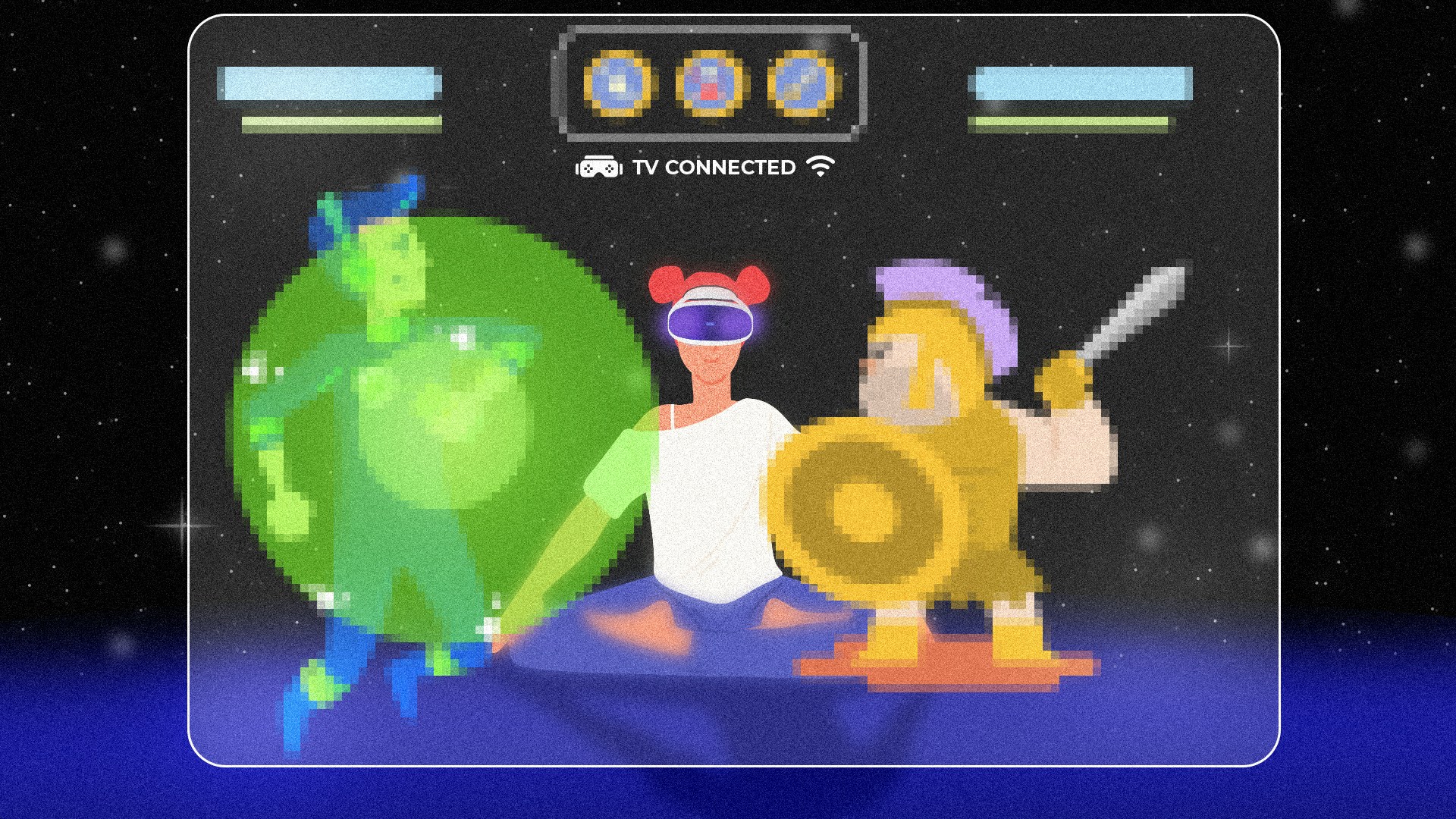The future of game engines

TOPICS
GamingIf you want to make a video game, you need a game engine.
Typically, this is a software framework that includes tools for things like rendering graphics, implementing physics and collision detection, adding sound and animation, and managing networking, localisation and myriad other things required for a game to function.
In the early days, a programmer often created all these functions from scratch for each game, sometimes reusing or adapting code from a past title. Gradually, developers began creating in-house game engines. From the nineties onwards, companies began licensing these engines to other developers.
For example, id Tech, the game engine that powered id Software’s 1993 megahit Doom, was used in later titles like Heretic from Raven Software.
Big publishers and studios still tend to use and develop their own in-house engines. Electronic Arts uses Frostbite, Ubisoft has Snowdrop, Capcom has the RE Engine, and so on. But away from the big publishers, two game engines have come to dominate the games industry: Unity and Unreal.
Back in 2018, the then-head of Unity Technologies, John Riccitiello, claimed half of all video games were made with Unity. Similarly, Unreal Engine has been used to create thousands of games, including high-profile titles such as Batman: Arkham Knight, Fortnite and Sea of Thieves.
Will these two engines remain dominant in the years to come? What happens if the companies behind them begin to falter? Let’s consider what the future holds for Unity and Unreal, and the competition they could potentially face.
How did Unity get so popular?
The company behind Unity, originally called Over The Edge Entertainment (later renamed Unity Technologies), was founded in Copenhagen in 2004 by Nicholas Francis, Joachim Ante and David Helgason. They put out the first version in 2005 with the aim of democratising game development, enabling anyone to easily make a video game.
Mobile games developer Timothy FitzRandolph, who worked on the 2011 Disney Mobile hit Where’s My Water? and more recently created the Apple Arcade title JellyCar Worlds, says the breakthrough for Unity came in the early 2010s, when smartphone games exploded in popularity.
“Unreal, you couldn't convince it to run on a mobile device at that point in time, like, at all,” FitzRandolph tells us. “Unity was this smaller, compact, well-designed little [engine], and they were able to turn on mobile, so it became this huge jumpstart for it.” Unity still dominates mobile, powering titles such as Marvel Snap and Pokémon Go. The company asserts that over 70 percent of the top mobile games are Unity-made.
Another thing that made Unity attractive was the ease with which it let developers port games to other platforms, thinks FitzRandolph. “Every time a new platform came out, they just added it,” he says. “If something happens from a platform point of view that’s interesting, Unity will be there, day one.”
The ability to easily port games between PC, console, mobile and others made Unity a favourite with indie developers in particular, especially since the basic version of the software was free.
Unreal gains a powerhouse reputation
Unreal Engine’s origins are quite different. It originally powered the 1998 first-person shooter Unreal from Epic Games (then known as Epic Megagames). Epic founder Tim Sweeney says he wrote 90 percent of Unreal Engine’s original code, which, upon release, was among the most technically impressive engines available.
Epic soon began licencing the technology to other developers for use in games such as Deus Ex. The company made big improvements to the engine with each of its numbered updates, starting with Unreal Engine 2 in 2002. The most recent update was Unreal Engine 5 in 2022, debuting alongside an impressive tech demo called The Matrix Awakens, featuring a near photorealistic city for the Matrix characters Neo and Trinity to explore.
Historically, Unity has been the cheap and flexible option; Unreal was for developers seeking graphical oomph at a cost (a 5 percent of gross revenue, to be exact). But over the years, the gap between the engines has narrowed considerably. Unreal has added support for various platforms, including mobile, and expanded the engine’s scope for use in a wider variety of genres. Meanwhile, Unity has beefed up its engine to the point where it’s capable of some seriously impressive graphics.
A decision made early in Unity’s lifetime means it’s often still associated with cheaper, less impressive games: Users of the company’s free plan must display the Unity splash screen at the start of their games, and can only remove it by upgrading to a paid plan. By contrast, Unreal took the opposite approach, insisting users on a paid plan display the Unreal splash screen, while those on a free plan don’t have to, meaning that the Unreal logo is only shown at the start of more expensive, professional titles.
Another reason Unity is less associated with generational leaps is that the company stopped adding version numbers to its software with Unity 5 in 2015, instead doling out piecemeal upgrades to different parts of the engine over the years. This resulted in a sense of slow, incremental improvement rather than the fanfare of change associated with new releases for Unreal Engine. Perhaps because of this, Unity plans to return to version numbers with Unity 6 in 2024.
The AI factor
As Unreal and Unity vie for dominance, each has been snapping up powerful middleware to give their engine an edge. Unreal Engine 5 now incorporates the MetaHumans character creator, which can generate realistic human faces, while Unity bought the tech division of Peter Jackson’s Weta Digital in 2021—which provided visual effects for movies like King Kong—with the intent of adding the firm’s powerful VFX tools to its engine. (Unity announced it would end its agreement with Weta FX in November 2023, laying off 265 staff in the process, but nonetheless chose to keep the rights to the Weta technology.)
AI represents the next frontier. Unity has already announced Muse and Sentis, two AI-driven tools currently in closed beta. The eventual aim of Unity Muse is to enable users to “create almost anything in the Unity Editor using natural input such as text prompts and sketches,” according to Unity, while Unity Sentis will allow users to embed neural networks into builds.
Mike Cook, an AI researcher and game designer who is a senior lecturer in the Department of Informatics at King's College London, thinks we’ll see gaming firms increasingly snap up AI middleware to integrate into their engines.
“If you look at Epic's MegaGrant scheme you can already see where they're looking,” Cook tells us over email, “like Motorica, who use AI to generate animations. This gives us an idea of the kinds of tools the big engine companies see as promising parts of their workflow in the future.”
“The temptation for game engine companies might be to try and integrate AI image generators and such into their tools because it seems to be the new trend, but that would drastically change the kind of product they are making,” Cook continues. Unity, for instance, was originally a tool for bringing together game assets, rather than making 2D or 3D art.
“Trying to be all things to all game developers generally leads to bloat,” he concludes.
Show me the data
As with all AI machine-learning programs, they are only as good as the data they’re built on. The question of where this data comes from “still looms over the whole AI industry,” Cook observes. “Are Epic and Unity going to create their own datasets? Are they going to create their own models? Creating your own generative AI system from scratch requires a lot of resources and know-how and has a whole bunch of other ethical hurdles to clear along the way. But the alternative would mean they relied on tools made by other companies, many of whom are still in court about their products.”
As AI’s legal ramifications rumble on, it’s likely we’ll see more scrutiny applied to the datasets used. The announcement of Unity Muse and Sentis in June 2023 saw developers like Mike Bithell call upon the company to disclose datasets, “otherwise commercial usage remains incredibly dangerous legally for your customers.”
Such calls for transparency can be at odds with the interests of AI middleware providers in a competitive environment, Cook notes. “One interesting clash we might see is that a lot of AI startups currently rely on keeping their secret sauce hidden from everyone to stop their idea being stolen,” he says. “But that might put off bigger companies from investing in their products and services, because there are already so many unknowns and question marks over these tools and how they work.”
Perhaps most importantly, there is a wave of antipathy towards AI among some game developers, who perhaps see the technology as a threat to creativity. “It's not just a case of whether a tool is useful,” says Cook. “It's about whether people want to use it, whether they want to change how they work. I'm hearing very mixed things from different departments in games studios. Some are quite enthusiastic, others don't want their job interfered with. Without buy-in from the people who use this stuff, they will find it much harder to have an impact on the industry.”
Beyond worries about AI, there are concerns about whether building an industry on third-party engine suppliers is even a good idea.
The Unity runtime fee debacle
On 12 September 2023, Unity made one of the most spectacular PR blunders in games industry history, by announcing a “runtime fee” for Unity users. This meant that after crossing a minimum threshold of downloads, developers would have to pay a small fee each time one of their games was installed.
The move caused confusion and uproar throughout the developer community. They asked anxiously whether the runtime fee would be applied to games that were part of subscription services, like Game Pass, or that were included in charity bundles. Others pointed out that pirated games could trigger a fee, and the system could inflict harm on certain developers if nefarious parties repeatedly install and uninstall their games to rack up huge bills.
Worryingly, the fee was also retroactive, meaning developers who made games with Unity years ago could be subject to the runtime fee—though it didn’t exist at the time they released their games. And exactly how Unity would track instals remained a mystery, with Unity only saying it would use proprietary technology.
Unity scrambled to address concerns, saying, for example, that service providers would pick up the runtime fee where games were part of a subscription service (which would be Microsoft in the case of Game Pass). But faced with overwhelming anger from developers, many of whom vowed to quit using Unity, the company was forced to backtrack and apologise on 22 September.
The revised plan ditched the idea that the fee would be applied retroactively, and would instead only apply to games made using the next version of Unity released in 2024. In addition, developers would have the choice between paying the runtime fee, or opting for a 2,5 percent revenue share, both of which would be based on self-reporting.
An industry earthquake
The Unity runtime fee debacle had numerous consequences. For one, it raised awareness of how many people rely on Unity for their business. Even when a game made in Unity is finished and released, the developer still needs to use Unity to create ports to other platforms, or make game updates for years after release. In the case of mobile games, such updates are necessary with the release of each iteration of the iOS or Android operating system, lest the game be rendered incompatible and pulled from online stores.
The runtime fee episode destroyed trust in Unity, and left developers wondering whether it was a good idea to tie their fortunes to a company that showed such capriciousness with pricing plans. Perhaps most alarming was the fact that the company felt the need to make such sweeping price increases in the first place. Unity posted the first profitable quarter in its 18-year history in February 2023, but returned to announcing a $125 million USD loss by November. Unity also announced wave after wave of redundancies in 2023: Nearly 300 job losses in January, around 600 in May, and another 265 in November.
Unreal Engine maker Epic similarly announced redundancies last year: 830 in September, roughly equal to 16 percent of the company’s workforce. CEO Tim Sweeney attributed the layoffs to Epic transitioning towards growing Fortnite as a metaverse: “I had long been optimistic that we could power through this transition without layoffs, but in retrospect I see that this was unrealistic.”
Despite the redundancies, Epic appears to be in a more stable position than Unity, which faces a self-declared “company reset”. Epic—and by extension Unreal Engine—is comfortably shored up by the dollar tsunami provided by Fortnite, which, despite occasional dips, remains incredibly popular, breaking its all-time one-day player record in November with 44,7 million users.
What happens if the Fortnite dollars begin to dry up? And what if Unity’s company reset proves unsuccessful? Such questions have left developers seeking an alternative.
The open-source game engine quest
There are various open-source game engines available, but the one that’s caused the most attention is Godot. Slay the Spire maker Mega Crit said it would switch from Unity to Godot for its next game, and Sable creator Shedworks told Edge magazine (issue 391) it also would consider Godot in the future. These are just two of many studios considering switching to Godot; Re-Logic, the developer of Terraria, went further by donating $100.000 towards the open-source engine, and pledging monthly donations of $1000 USD.
“My initial experience was very positive,” says FitzRandolph, who tried Godot for the first time in 2023 during a game jam. He was particularly impressed with its speed; Unity, he says, has gotten slower as more features were added.
“I think I'm probably representative of a group of people who are probably overly rose-coloured glasses right now, because the initial experience stands in such stark contrast to what my day-to-day has been,” FitzRandolph continues. “If I go try and make a larger, real game with it, I'm going to uncover the missing things that aren't done yet.”
That’s the problem with Godot right now. It currently lacks many of the features of Unity and Unreal. Then again, as Cook suggests, it’s debatable whether some of the AI features Unity and Unreal are pursuing are even desired by many coders.
Godot is also gaining momentum, and has attracted motivated and talented developers, particularly those disillusioned with Unity in the wake of the runtime fee announcement. They could potentially build this open-source platform into something formidable, similarly to how the open-source Blender 3D graphics software tool has come to rival the paid-for program Maya.
Or Godot could remain a worthy, yet comparatively little-used, tool, like how the open-source operating system Linux is overshadowed by Microsoft Windows. Only time will tell, but the winds blow in Godot’s favour at the moment.
The flight to third parties
Whatever happens with Godot, the trend towards third-party game engines looks set to continue. Even big software houses with their own internal engines have switched in some cases. CCP, the studio behind the long-running MMORPG EVE Online, chose to use Unreal instead of its in-house Carbon engine for its first-person shooter EVE Vanguard. EA Motive announced in October 2023 that it would use Unreal Engine 5 for its next Iron Man game instead of EA’s in-house engine Frostbite. CD Projekt RED plans to ditch the studio’s REDengine in favour of Unreal for forthcoming Cyberpunk 2077 and Witcher games. Indeed, Unreal Engine 5 is gaining many new converts thanks to its impressive graphical power.
The age of the in-house engine appears to be drawing to a close. The sheer amount of time and resources required to build an engine from scratch means it makes little economic sense for studios to even try, particularly for those at the smaller end of the scale. In-house engines can have big benefits: They can be tailor-made to suit a genre, and go beyond the capabilities of the generalist Unreal and Unity engines in certain areas. But the years of work required to make them—then maintain and upgrade them—make them economically unfeasible for many, at a time when modern games already take multiple years to make.
Throwing your company behind a third-party game engine also means ceding control: Nothing guarantees your studio’s favoured features will even be supported in five to ten years’ time. And it means betting on the long-term future of the company that makes it.
Naturally, it’s reassuring that half of video games are made using Unity. But it’s also unsettling to think that if that company were to fail—which empires do every day—it could take half the sector with it.
04 Apr 2024
-
Lewis Packwood
Get a digest of what's coming, right in your inbox.
02/03
Related Insights
03/03
L’Atelier is a data intelligence company based in Paris.
We use advanced machine learning and generative AI to identify emerging technologies and analyse their impact on countries, companies, and capital.


